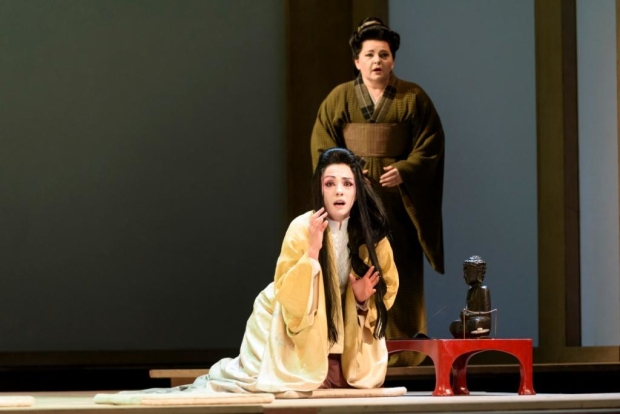Review: Madama Butterfly (Royal Opera House)
Emotional extremity as Ermonela Jaho delves fearlessly into Puccini’s tragedy

© Bill Cooper
This is more like it. Two years on from the last revival when Kristine Opolais gave us her queen-in-a-kimono Cio-Cio-San, proportion returns to the Royal Opera‘s production of Madama Butterfly.
Ermonela Jaho is the singer I’ve longed to hear as Butterfly and she doesn’t disappoint. It takes a selfless, soul-searching artist to lift Puccini’s opera out of melodrama and into tragedy, and such beasts are rare. Indeed, the only equal to Jaho whom I’ve encountered in 21st-century lepidoptery is Anne Sophie Duprels, the French soprano who wowed London earlier this week in Poulenc’s La Voix humaine. Both singers share the ability not just to plumb a character’s emotional depths but, once there, to flay them.
Jaho’s starting point, necessarily in Moshe Leiser and Patrice Caurier‘s sturdily practical production, is to present her as a near-literal butterfly, her billowing sleeves the wings, her long black tresses the thorax. And if that sounds like a cheap effect in Agostino Cavalca‘s costume designs, then all I can say is it depends who’s wearing it. In the last scene Jaho’s Cio-Cio-San is transfixed, pinned through and effectively dead before her suicide. It is shattering.
Vocally, the Albanian soprano dared to falter or be hushed as the moment demands, even in the wide open spaces of the Royal Opera House; but her set piece arias "Un bel di" and "Che tua madre" were properly big and harrowing. Over recent seasons Jaho has developed into a formidable star; but never a diva.
Although he’s a fine and forthright tenor, Marcelo Puente was rather less remarkable as the wretched Lt Pinkerton than his immediate predecessor, Brian Jagde, and with his scoops-for-hands acting he detracted slightly from Jaho’s intensity. But he did not deserve the pantomime boos that seem to beset any tenor who dares to take on this role these days.
'A perfectly controlled timbre of chiaroscuro beauty'
Scott Hendricks was a reliable if self-effacing Sharpless, Carlo Bosi a snivelling marriage broker, and Yuriy Yurchuk a molasses-voiced Prince Yamadori in his one brief appearance. However, it was Elizabeth DeShong‘s Suzuki who gave Jaho her finest partnership. We see too little of this exceptional American mezzo on our shores—indeed, this is her Royal Opera debut—but she has a voice like a low-flying soubrette: pinpoint attack with no contralto spread, just a perfectly controlled timbre of chiaroscuro beauty.
The settings by Christian Fenouillat are restrained and idiomatic, although there’s more going on in them than at first meets the eye. His use of changing backdrops beyond the Japanese screens ensures that there’s plenty of variety despite the unchanging stage. Only when electromagnetic magnolia blossom comes thudding down from its tree during Butterfly’s death scene is there a critical misstep.
Leiser and Caurier’s production ideas are shrewdly realised, although Puente struggles to inject the desired leer to his voyeurism during the first-act undressing scene. There is a clumsy moment when the agitated Pinkerton rushes out past his wife (Emily Edmonds) as she enters through it, yet they do not see each other. Other than that, all’s good.
Music director Antonio Pappano is currently juggling Madama Butterfly with Die Meistersinger, and with barely twelve hours between shows he might be forgiven for supplying a routine reading of the shorter work. Not a bit of it. His mastery of this repertoire ensured impeccable musical judgement, even in the broad-brush lush sections. When it mattered he had the confidence to channel Puccini’s inner Richard Rodgers.
Madama Butterfly continues in repertory at the Royal Opera House until 25 April.












